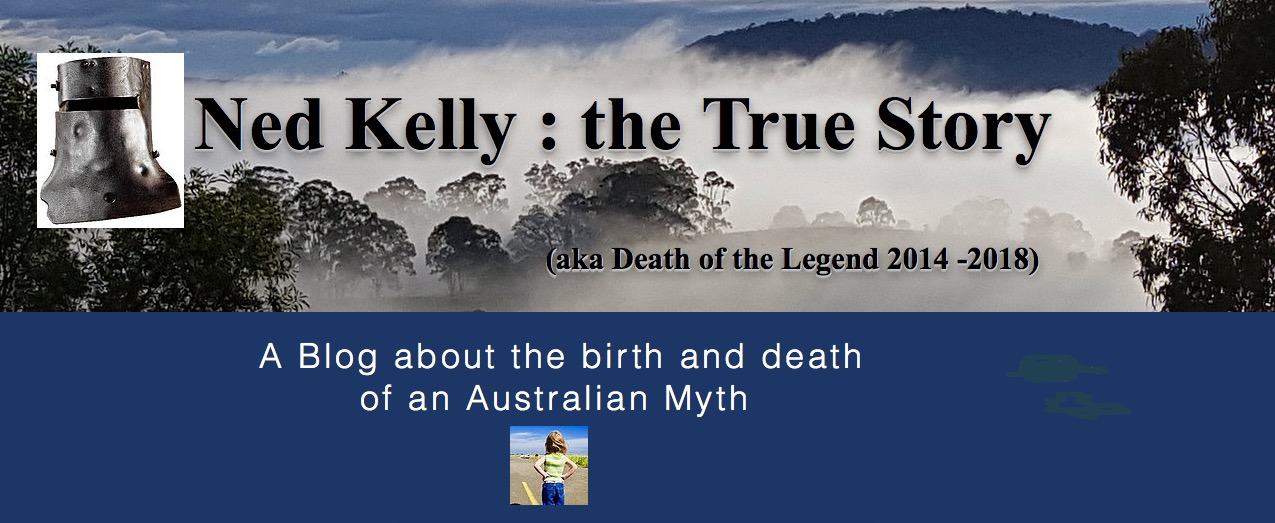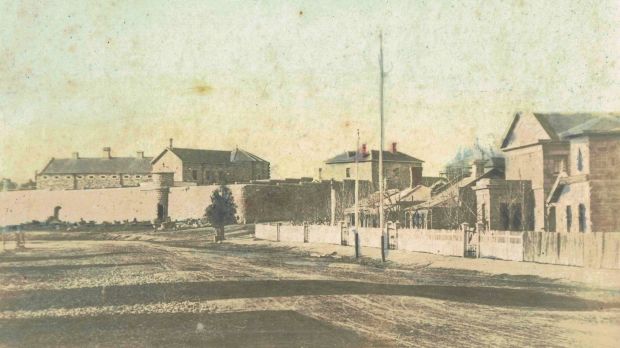Ten days before he was hanged Ned Kelly claimed that ill
treatment and persecution of his family by Police were what drove him to behave
as he did. He wrote : “If my lips teach the public that men are
made mad by bad treatment, and if the Police are taught that they may
exasperate to madness men they persecute and ill treat, my life will not be
entirely thrown away”. This is the central tenet of the Kelly story, the
belief that ill-treatment and persecution ‘exasperated
to madness’ and compelled Ned Kelly to take a stand because, as he claimed “There never was such a thing as justice in
the English laws but any amount of injustice”
It is of course, quite common for accused or convicted
criminals to claim to be innocent victims of a corrupt system, but examples of
innocent people being wrongly convicted and even executed for crimes they didn’t
commit are rare; they exist but they are rare - most such claims turn out to be
wishful thinking. Ned Kellys audacious claim to be innocent is made even more
outrageous by the fact that he openly admitted to stealing ‘innumerable’ horses
and cattle, to robbing two Banks and to killing three Policemen, and attempting
the railway massacre, hostage taking and siege at Glenrowan. Such extreme
behavior couldn’t possibly be justified by petty or minor breaches of Protocol
by local officials – extreme responses must surely require extreme provocation.
To be in any way justified, such extreme behavior could only be a response to
an equally audacious program of extreme persecution and corruption, which of
course is what the Kelly legend claims was the case. But what is the evidence
for such persecution?
In the previous four posts looking very carefully for
the evidence of extreme persecution and corruption, what we have seen is that the
actual historical evidence, the official records and the newspaper reports from
the time thoroughly contradict this claim of Ned Kelly’s. Looking carefully at
each one of the numerous interactions between the Kellys, the Police and the
judiciary, up to four years before Ned
Kelly was hanged, its impossible to find evidence of any sort of systemic or
routine persecution or ill treatment of the Kellys, let alone something extreme
and harsh enough to justify the crimes of the Kelly Gang. Instead the pattern
that emerges is of a system that frequently gave the Kellys the benefit of the
doubt, dismissal or reduction of possible criminal charges, offers of
sympathetic help, and surprisingly generous remissions of sentence. It was a
system that when necessary the Kellys themselves had sufficient confidence in
to make use of themselves in private actions. Moreover, when Ned Kelly was in
Gaol, and later when he was allegedly ‘going straight’ for a couple of years,
the record shows that the Police took no interest at all in the Kellys, leaving
them completely alone. That, unequivocally is what the historical records show
: zero evidence for systemic corruption,
Police persecution and ill treatment of the Kellys.
In this series of Posts I haven't yet discussed the
last two recorded interactions between Ned and the Police before he took to the
bush after Fitzpatrick was wounded at the Kelly household in April 1878. These
incidents were the so-called Lydeker case from 1876, and Neds arrest in
late 1877 for drunkenness. I wont discuss either of these cases here because I discussed
the detail of both of these incidents a couple of years ago ( HERE and HERE ).
Read them and see yet again, they provide absolutely no support for the poor
persecuted Ned Kelly myth. The Lydeker case shows Ned once again being
acquitted of something he almost certainly was guilty of because of the strict
way the Law was followed by the Courts, making a mockery of his complaint that
there was ‘never such a thing as justice in the English laws but any amount of
injustice’. Neds immature reaction to the arrest for being drunk resulted in
the fine he had to pay being 60 times greater than it would have been if he had
simply accepted the charge and the minor penalty. I cannot believe there are
people who think that Neds violent behavior in this matter ( resisting
handcuffs, and then claiming his drink was spiked ) is in any way consistent
with a person capable of having high minded political vision about democracy
and justice and a Republic. His behavior was typical of a drunken moron.
There remain a few other arguments that are advanced
in support of the idea that the Kellys were persecuted, the first of which is
the oft repeated claim that Supt Nicolson issued a directive that the Kellys
were to be arrested, charged and put in
Prison for the slightest of misdemeanors “to
take their prestige away from them”. Ian Jones wrote that “This opinion- which seems suspiciously like
a directive – is often quoted as proof that there was an official policy of ‘persecuting’
the clan” Peter Fitzsimons wrote “From
now on…it is official police policy to look for an excuse to put the family and
their cohorts behind bars” Surely THAT statement is proof of Ned Kellys
claim that there was a campaign of Police persecution? Well, no it isn’t.! Its actually another of
the myths perpetuated by Kelly supporters and repeated by followers who never
bothered to read what Nicholson actually said. In any case, he said this in
April 1877, much too late in the Kelly saga to give support to the idea that
such a campaign was responsible for Neds anti-social behavior. By 1877 he had
been in prison twice, and at that exact moment, though Nicholson may not yet
have known it, Ned had already launched his criminal career of ‘wholesale and retail horse and cattle
dealing’
What Nicolson actually said was that in his
opinion ‘that without oppressing the people or worrying them in any way, that he
should endeavor whenever they commit any paltry crime, to bring them to justice
and send them to Pentridge even on a paltry sentence the object being to take
their prestige from them, which has as good an effect as being sent into prison with very heavy
sentences …and that is a very good way of taking the flashness out of them’ . The
very clear instruction was not to do what Peter Fitzsimons carelessly repeats
from every other Kelly source, and to look for excuses to put the family behind
bars but rather Nicholson makes it plain that the Kellys are NOT to be oppressed
or worried ‘in any way’. Nicolsons
instruction regarding the Kellys is ‘do NOT provoke them, do NOT attempt to
entrap them, do NOT set them up or frame them, do NOT persecute or oppress or
worry them IN ANY WAY!. This is the absolute OPPOSITE of a campaign of
persecution . However, given the known lawlessness of the extended family of
Kellys and Quinns, Nicolsons view was that if they put a foot wrong, the full
force of the Law should be applied. What
Nicolson is affirming here is the absolute rule of law. And as we have seen,
when the Kellys didn’t put a foot wrong, the Police left them alone.
This observation of the fact that when the Kellys were
not breaking the Law they were left alone, is exactly the opposite of what
would be predicted if Ned Kellys claim about unjust persecution was true.
But what about the Royal Commission some will say? The
Commission severely criticized Police for the way they behaved during the
outbreak and some of them were censured and demoted or recommended for early retirement and others
were sacked. Isn’t that proof of what Ned Kelly claimed, that the Police were
corrupt and waged a campaign of ill-treatment and persecution against him and against his family? Such a
question demonstrates that the person
asking it couldn’t possibly have read the Reports of the Royal Commsission and
is simply repeating the myths about it created by a litany of Kelly
writers that goes at least as far back
as Kenneally and as recently as Ian
Jones, Justin Corfield and Peter Fitzsimons. The answer to the question is an
absolutely emphatic NO, because the Commission specifically addressed that
question and answered it in their findings as follows :
“ It may also be mentioned
that the charge of persecution of the family by the members of the police force
has been frequently urged in extenuation of the crimes of the outlaws; but,
after careful examination, your Commissioners have arrived at the conclusion
that the police, in their dealings with the Kellys and their relations, were
simply desirous of discharging their duty conscientiously; and that no evidence
has been adduced to support the allegation that either the outlaws or their
friends were subjected to persecution or unnecessary annoyance at the hands of
the police.”
There is no ambiguity or wriggle room in this
statement. The Royal Commission, which sat for more than six months and interrogated 64 witnesses, and even visited Mrs. Kelly in
her home at Greta concluded there was no evidence to support what we now know
is the greatest of the Kelly myths, that the Kellys and their friends “were subjected to persecution or unnecessary
annoyance at the hands of the police”
There is perhaps one other response that sympathisers
might have - they might say the absence of evidence is what you would expect
from such corrupt and devious authorities, because they completely covered their tracks and
concealed all the evidence - in other words a conspiracy theory. If that WAS
their argument, it would at least mean they had conceded that there was no
actual empirical evidence for their ‘poor persecuted Ned’ theory. But, as I
have written before, any theory advanced without evidence can be dismissed
without evidence.
The truth of the matter is that Ned Kellys claim that he was driven to
crime by police persecution and ill-treatment is simply a lie. It simply didn’t
happen. It’s a myth, and the biggest of Ned Kellys lies, yet another falsehood
that he managed to trick many into believing was true, a lie which the Kelly
descendants and their supporters perpetuate to this day. The
idea that it was Police persecution that drove Kelly to crime is now utterly
exposed as a myth, an excuse cooked up by Ned Kelly to direct blame away from
himself, where it belonged, onto the scapegoat of the Victoria Police. Ned
Kelly, the police made criminal is a myth whose time has ended, its a Kelly
story that can safely be consigned to the dustbin of history.




